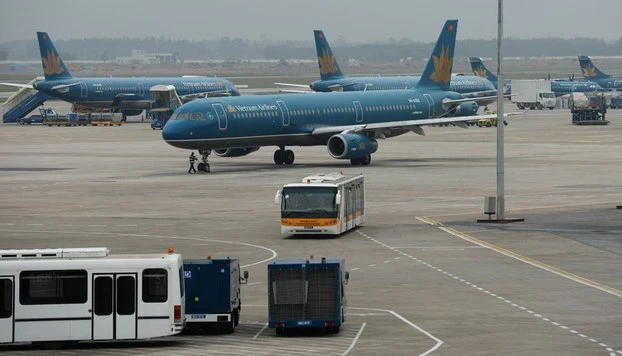
Despite several obstacles in procedures and policies, and endless hassles in implementation, investors are still pushing for a hold in some part of this fast growing and essential field of business.
ACV is not entirely autonomous
As an enterprise, ACV is managing and operating twenty one airports across the country. In 2019 company revenues were around VND 19,000 bn, exceeding by VND 8,000 bn from the previous year. Due to its effective and efficient management, ACV now has upto VND 25,000 bn in savings, and is expecting to bring this figure upto VND 87,000 bn by 2025. This will allow the company to invest in more airports throughout the country as planned, and still have left with sufficient funds to invest VND 25,000 bn in the forthcoming Long Thanh airport.
The efficient business model of ACV has led more and more outside businesses to invest in the airport sector. In particular, this sector is looking much more attractive after investors see the efficient running of the Van Don airport and the passenger terminal at Cam Ranh airport, both of which are being operated by private investors.
However, the infrastructure is becoming increasingly more overloaded and unable to cope with market growth and the fast pace of development. Even though ACV has constantly received favorable support from the Government and the Ministry of Transport (MOT), as well as the State Capital Management Committee for enterprises, it is also under severe pressure and a "victim" of excessive investment in the field of aviation, but without any operational autonomy.
Mr. Lai Xuan Thanh, Chairman of Board of Directors of ACV, said that despite sending repeated reports, proposals and requests in the last four years for the urgent need to repair the runways to ensure aviation safety, ACV is still waiting for the Government to approve clearance from the flight zone management body. ACV is entitled to only use capital for major repairs when it is assigned for it. ACV is currently struggling with minor repairs and hourly runway monitoring of two major airports, namely, Noi Bai and Tan Son Nhat international airports. The heavy rush demand at Tan Son Nhat airport can peak at a record 56 flights per hour on any given day.
Due to the current authorized operational procedures, ACV does not have the right to invest in upgrading and expanding in any airport. For instance, ACV wants the opportunity to invest in building T3 terminal, considered a highly profitable venture, but management agencies are dragging their feet in choosing the right investors. Mr. Lai Xuan Thanh said that bidding is not fair for ACV, because this enterprise manages twenty one airports but only six airports are running profitably, while other airports are suffering losses. Among the airports showing profits are the Noi Bai, Tan Son Nhat and Da Nang airports, while among the airports showing massive losses upto VND 80 to 90 bn are the Vinh, Tuy Hoa and Can Tho airports.
An ACV representative also said that the company had suffered losses for a long time because it has to continue to carry out political duties even when the market is weak and slow, as no business wants to participate at such times. Only when the market looks attractive, outside players want to immediately jump in to grab a slice.
Aviation experts await positive changes
According to aviation experts, the first difficulty that has to be cleared is for the regulatory agencies to decide the appropriate procedures and criteria to select investors for building of airports. As aviation is a specialized area, it is of utmost importance to clarify the investors credentials and experience in the aviation industry, along with economic potential and ability to manage in the long term. The latter is clearly an important issue because without the ability to manage in the long term, the investment is wasted, and upgrading and maintenance of airport infrastructure will suffer.
Aviation experts are awaiting for drastic and positive changes to take place in the aviation investment procedures, with some new and more secure policies taking effect. The Government issued Decree 89/2019/ND-CP (Decree 89) on November 15, amending and supplementing a number of articles of Decree 92/2016/ND-CP in areas of civil aviation, and Decree 30/2013/ND-CP on air transport businesses and aviation activities in general.
- Mr. Lai Xuan Thanh
Mr. Dinh Viet Thang also said that in the immediate future, CAAV will solve the problems faced at Noi Bai and Tan Son Nhat International Airports. Inadequacies in procedures regarding upgrading and repair work at airports will be included in the amended Decree 102/2015/ND-CP to prepare for a number of other airports. Because in coming times, some other airports will certainly become hotspots that need to have improved capacity. Mr. Thang said that even Long Thanh international airport must have a new unique mechanism to ensure completion on time, and fully operational by 2025 as planned. Currently, many investors from Sweden, Japan, Korea, China, and USA have shown their interest in Long Thanh airport. However, investors are still worried about the government not guaranteeing loans for the first phase of the Long Thanh International Airport project, as per a feasibility report released by the National Assembly.
Mr. Le Anh Tuan, Deputy Minister of Transport, has assured that in coming time, the Ministry of Transport and CAAV will focus on removing legal obstacles in civil aviation, create favorable conditions for investment in the airport sector, and ensure a good response to the growth of the aviation market.




















